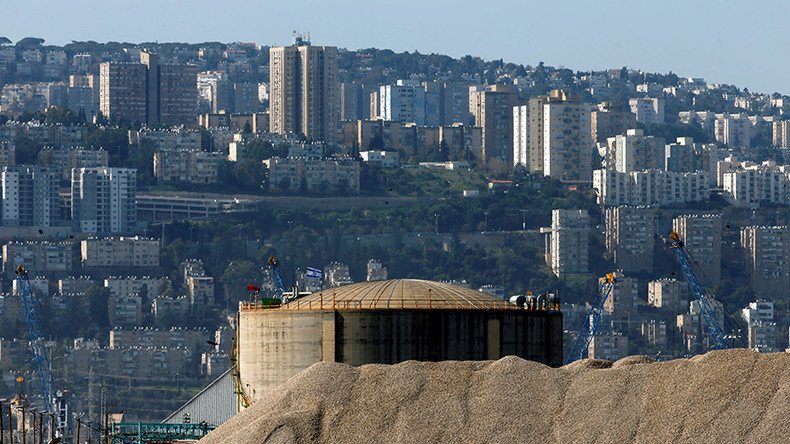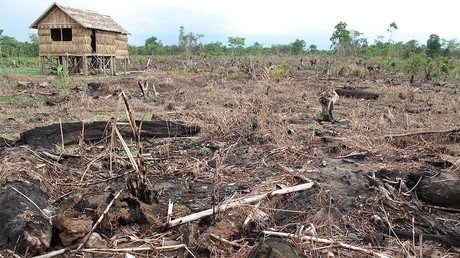‘5 atom bombs’: 3,000 local Israelis protest ammonia facility with potential to kill 600K people

Around 3,000 people gathered outside Haifa District Court on Sunday to demand the closure of an ammonia storage facility that is said to be potentially more deadly than five of the atom bombs dropped on Hiroshima.
Judges in the district court deliberated for around three hours as a crowd of environmental protesters gathered outside.
Middle and high schools around Haifa and nearby towns also went on strike, with all classes cancelled from 8am till noon to allow the students to take part in the protest.
“The ammonia tank endangers and threatens hundreds of thousands of citizens living in the Haifa district. I call on all teenagers to ask the hard questions, create a discourse, become actively involved and go and protest for the relocation of the ammonia tank,” said Haifa District Student Council Chairman Noy Krief, as quoted by Ynet.
In an earlier ruling, Haifa’s Court for Local Affairs gave the Haifa Group, the fertilizer producer that operates the tank, until February 22 to remove its chemicals from the facility. Israel’s Environmental Protection Ministry also said it would not renew the tank’s permit when it expires on March 1.
After initially saying it would comply with the court’s decision, the company filed a last-minute appeal, accusing Haifa’s authorities of trying to “sow fear among the public,” arguing that its facility is crucial to the local economy and closing it will cost jobs. It was granted a stay until Sunday’s hearing.
The facility was declared a danger to public health after the Technion Institute of Technology published an expert report in January, which said the site had not been properly inspected since it was built 30 years ago. If the ammonia tank was to rupture, for example, as the result of an earthquake or terrorist attack, the released gas could suffocate 16,000 people. This fact was not lost on Hezbollah leader Hassan Nasrallah, who threatened to launch rockets at Haifa’s ammonia tanks, as well as a nuclear facility in Dimona, should a conflict erupt with Israel.
“I call on Israel not only to empty the ammonia tank in Haifa, but also to dismantle the nuclear reactor in Dimona. Our military capabilities will strike Israel and its settlements,” he said in a televised speech, the Jerusalem Post reported.
Apparently picking up on the idea, one of the protesters outside the court dressed up as Nasrallah for the rally.
נסראללה בחוץ, קורא להשאיר את המיכל. השופטת באולם. עורכי הדין של חיפה כימיקלים לא כאן!!!! @haifacitypic.twitter.com/12KPL4WTQj
— Zalul | צלול (@Zalul) February 26, 2017
However, the shipments of ammonia the facility receives through the city’s port each month pose an even graver threat. If the delivery ship’s cargo leaked into the air, it could kill as many as 600,000 people in the local area.
“To bring down the Twin Towers in New York, the terrorists did not need dozens of tons of explosives; rather, they realized the destructive potential of a giant passenger plane, full of fuel, traveling at high speeds,” the report read, noting “the Hezbollah secretary-general was absolutely right about the inherent destructive potential of the container and, more important, of the ammonia ship.”
“The ammonia ship that enters the Haifa Bay every four weeks is akin to a ship carrying five primed atom bombs, each more deadly than the one dropped on Hiroshima,” the report added.
The report’s findings prompted Jameela Hardal Wakim, leader of an NGO called Citizens for the Environment, to press Haifa Municipality to request that the Local Affairs Court issue an immediate order to shut down the tank. This was granted on February 12, until the Haifa Group filed its appeal.
Former Environmental Protection Minister Zeev Elkin has criticized the Haifa Group for not pursuing alternatives, such as moving the facility to the southern Negev desert.
“It is up to the government to close the plant and remove this horrific danger from the citizens of Haifa and North,” he said, as quoted by the Jerusalem Post.
“The suitable solution to this situation is reopening it in Mishor Rotem, and by doing that it would also create places of work in the South.
“Luckily, the court saved the public from danger, and its decision, which motivated the government to act, might have prevented a large-scale disaster,” he said.
Judge Tamar Sharon Netanel promised that the District Court would reach a decision by Wednesday at the latest, the Times of Israel reported.














